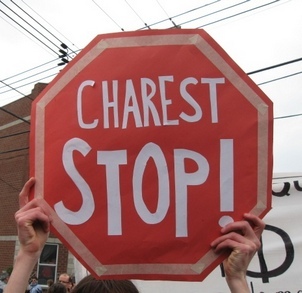After 14 weeks of student strikes in Quebec, the provincial Liberals announced last night that they will introduce a law that would suspend the semesters at colleges and universities if striking students do not stop holding picket lines or enforcing strike votes.
Student representatives were fast to denounce the regulation, calling it a “lock-out” and saying it will only add “fuel to the fire.”
“Tonight, the government spit in the face of a generation…We will remember how we were treated tonight for a long time,” said Gabriel Nadeau-Dubois, co-spokesperson for the Enlarged Coalition of the Association for a Solidarity Among Student Unions (CLASSE), at a press conference.
As the government’s intentions became clear throughout the day, various voices spoke out against the government using legislating to deal with the conflict, including the Quebec Bar Association, and even a group of students which is actively mobilizing in favor of the tuition fee increase.
Over 155,000 students remain on strike in 14 colleges and 11 universities across the province. Since the government made its latest offer to students, some 325,000 have voted against it. It is the longest student strike in Quebec and Canadian history, launched in opposition to the provincial government’s plan to increase tuition fees by 82 per cent over seven years.
Tonight’s government proposal came in two parts:
At schools where students are on strike, students, administrators and teachers must come to an agreement that would allow any student who wishes to return to class – even those whose associations have voted in favor of the strike – to be able to do so. This includes putting an end to all pickets lines or any other disruptive tactics used to ensure the strike vote is respected. If such an agreement is reached, classes will continue normally for the remainder of the semester.
For those schools where such an agreement is not reached, classes will be suspended immediately, and will resume in August, with each school taking on the task of determining what the schedule should look like. The example of the Université de Montréal has been given, where winter semester classes are being suspended until mid-August. They will then run until the end of September. The Fall semester will begin at the start of October – a month late – and finish in mid-January.
The second part of the proposed law will serve to “guarantee the right to education,” said the government in a release. It is believed that this means the government will introduce methods to enforce the ban on picket lines, possibly through major fines. The exact details will only be revealed when the bill is introduced in the National Assembly on Thursday.
Following the announcement, over 1,000 people took to the streets of Quebec City, while up to another 20,000 people marched in Montreal.
The effect of the law, said CLASSE, is essentially the same as a lock-out: at schools where students are still on strike, they either stop enforcing picket lines – eliminating any power that the strike may have – or they will see classes suspended, removing the element that they are striking against.
“This is a lockout, in the end, because it stops students from exercising their democratic rights in general assemblies,” said Jeanne Reynolds, CLASSE’s other co-spokesperson.
The Quebec Federation of University Students and the Quebec Federation of College Students also spoke out soon after the government announcement. They said that they are already preparing to launch a legal challenge against the legislation, should it be adopted. The Liberal party has a majority of seats in the National Assembly, so there is little doubt it will pass.
The proposed law comes as tensions have continued to rise on campuses. As the strike continues, more and more students have turned to the courts to seek injunctions allowing them to return to class, even if their student associations have voted by a majority to strike. In most cases, these injunctions have been approved since, while student unions are officially recognized under Quebec law, their right to collectively strike is not. Therefore the courts and the government see participation in the strike is a personal choice. The result is that if one student out of several hundred – or in some cases thousand – wishes to return to class, they have been granted an injunction to do so.
While the right of students to strike is not legislated, it has been accepted as a practice in the past. As court injunctions multiply though, striking students have taken action to protect the legitimacy of their strike votes. The result has been hard picket lines and classroom disruptions. In response, both local and provincial police have been dispatched to campuses, ratcheting up tension and resulting in arrests, injuries (often from batons), and tear gas and pepper spray being used.
“Each MNA who votes in favor of this law will have to live with consequences,” said Reynolds. “Government intransigence has already seriously injured individuals.”
CLASSE has called for a major demonstration in Montreal on May 22, two months after some 300,000 marched against the tuition fee increase, to show that the opposition remains.
Tim McSorley is an independent journalist in Montreal and an editor at Media Coop, where this article was originally published. The article is reprinted here with permission.



